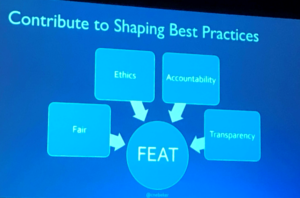
Every year, the Precision Medicine World Conference attracts recognized leaders, global researchers and medical professionals, and innovators across healthcare and biotechnology sections. This year was no exception, with delegates in attendance such as Carl H. June who developed CAR-T therapy, Ralph Snyderman a pioneer in Personalized Health Care and Craig Venter who has given many contributions to genomic research. These and many others made an outstanding conference to start 2019.
Hot topics covered in this year’s conference included artificial intelligence and machine learning, big data, real world evidence for clinical decision making, and implementation of precision medicine into the clinical setting. Some of the efforts were being done to combine therapies in cancer patients and issues on data privacy, data sharing and data ownership.
Artificial intelligence/ Machine learning in precision medicine
Over the last 60 years, the Artificial intelligence/ Machine learning (AI/ML) environment has evolved dramatically. This field started in the mid-50s where the focus was on artificial intelligence. This then evolved to a machine learning approach in the late 80s. Now, in the era of deep learning, which is a subset family of machine learning methods based on learning data representations, it appears there are many challenges for their implementation into healthcare systems.
Initially, it was thought that artificial intelligence would be used for early disease detection to support clinical decision making and to explore large datasets that would ultimately inform novel diagnostics.
Over the past few years, the progress within the field of deep learning software for precision medicine has been rapid, with some machine learning algorithms being approved by the FDA already. However, we are still in the “hype” of AI rather than in the realities of implementation.
This was discussed by William Dalton and Atul Butte in this first session at PMWC. Among the many challenges to ensure the 5 ‘V’s of big data (velocity, volume, value, variety and veracity), this session discussed the need for independent validation of these datasets as well as the imperative need for the formation of networks.
For implementation to succeed – discussed by Ketan Paranjape – curated datasets that reduce bias and ensure appropriate privacy and security should be at the centre. The creation of payment methods to incentivize the healthcare system to reimburse for this, as well as the education of physicians into the basic understanding of the potential and limitations of AI, are among some of the considerations.
Real world evidence to inform research and clinical decision making
A great panel discussion focused on the uses of real-world data in research and clinical decision making, together with the challenges encountered when using this big data datasets. Session chair, Deborah Schrag, introduced the definitions of real world data (RWD) and real world evidence (RWE) published last December by the FDA. The FDA framework includes considerations on whether RWD are fit to use, whether the trial or study design used to generate RWE can provide adequate scientific evidence to answer or help answer the regulatory question and whether the study conducted meets FDA regulatory requirements. The importance of such a framework cannot be underestimated given the many diverse uses of RWD/RWE.
Let’s change artificial intelligence to documented intelligence
For instance, Deborah Schrag, at the Cancer Centre in Harvard, discussed the use of RWD to find common denominators on subsets of patients that have been prescribed off label drugs for their cancer. This research will elucidate whether off label drugs can be used in certain cancer types. In another session, Shawn Sweeney, Director of the AACR Project GENIE Coordinating Centre, discussed their construction of the largest tumour sequencing database linked with clinical data. This will be used to inform decision making as well as clinical actionable targets.
The results from this type of research will likely offer countless opportunities for future clinical decision making. However, in order to implement appropriately, the challenges commonly associated with large datasets need to be resolved. Ensuring the de-identification of participants and harmonization of the data, the modernization of healthcare standards to record clinical data, as well as the support to healthcare professionals to ensure good quality of data entry are among some of the obstacles that should be addressed first.
Data sharing, data privacy and data ownership
Data sharing, privacy and data ownership have become contemporary issues, extensively discussed at PMWC this year. While some strategies to enforce data privacy and ownership such as GDPR, HYPAA and the Japanese PIPA have been implemented; there are still huge governmental gaps and rules.

Who owns the data or how do patients understand what is happening with their data were some of the questions raised. One approach would be the empowerment of individuals and the creation of value through their own data, discussed by Dawn Barry.
In addition, in this new era of data, many ethical issues need to be considered. Camille Nebeker discussed some of the ethical challenges that digital research is facing. She advocates for a FEAT framework (fair, ethical, accountable and transparent); in order to do so, she encouraged organizations to create and take a code of ethics, encourage employees to question the questionable, to talk and learn from end users and to involve “health tech” ethicists.
In summary, this inspiring conference has outlined the major advancements in precision medicine over the last 10 years as well as discussed key challenges and future directions to transform the current healthcare systems into precision healthcare systems!
BMC Medicine is launching a new article collection: ‘Beyond Big Data to new Biomedical and Health Data Science: moving to next century precision health’. We are welcoming submissions for this exciting collection with four exceptional Guest Editors. We invite manuscripts and front matter content looking at data-driven approaches for patient care with a strong focus on policy making, clinical implementation and public health importance
Comments